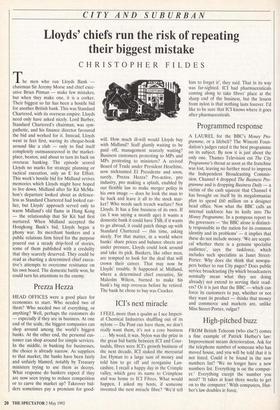Programmed response
A LAUREL for the BBC's Money Pro- gramme, or a lifebelt? The Wincott Foun- dation's judges rated it the best programme on its subject. By now it is just about the only one. Thames Television cut The City Programme's throat as soon as the franchise was lost, leaving no further need to impress the Independent Broadcasting Commis- sion. Channel 4 dropped The Business Pro- gramme and is dropping Business Daily — a victim of the cash squeeze that Channel 4 has brought on itself by its megalomaniac plan to spend £60 million on a designer head office. Now what the BBC calls an internal taskforce has its knife into The Money Programme. In a pompous report to the governors — `the BBC alone is distinct- ly responsible to the nation for its common identity and its problems' — it implies that these do not include money. `We are scepti- cal whether there is a genuine specialist audience', says the taskforce, which includes such specialists as Janet Street- Porter. Why does she think that newspa- pers bother to run City pages? Does public service broadcasting (by which broadcasters normally mean what they are doing already) not extend to serving their read- ers? Or it is just that the BBC — which can force its customers to pay, whether or not they want its product — thinks that money and commerce and markets are, unlike Miss Street-Porter, vulgar?


















































 Previous page
Previous page